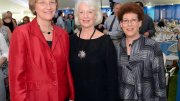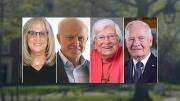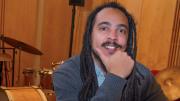If a young child is capable of having an epiphany, that is exactly what happened to a then-six-year-old Jane Alexander, recipient of the 2013 Radcliffe Medal. Her father, returning home after five years’s service in World War II, had taken her to see a Danish ballet in an effort to get to know her a little better. As she watched the dancers twist and turn their sinewy bodies under the bright stage lights, Alexander said, she realized her life’s calling was the arts.
“I remember sitting there thinking, ‘Oh my god, is this possible? Does this really exist in life? This beauty, this ability for dancers to leap like birds into the air, the colors, the lights, the sound, the music…’” Speaking on May 31 in the Radcliffe Yard, Alexander, an actor and former chair of the National Endowment for the Arts, explained that she “had no television; all I ever heard was my mother listening to war news on the radio.”
Although she realized her passion for the arts at a young age, Alexander’s path to acting took several unexpected turns. After completing two years at Sarah Lawrence, she spent her junior year abroad at the University of Edinburgh, where she fell in with a wild crowd, “hitchhiking with abandon” all over Europe and focusing more on partying than academics.
Eager to quit college and act full time, Alexander faced resistance from her father—the former doctor for Harvard’s football team—who wanted her to transfer to Radcliffe and complete her undergraduate degree. But her poor grades kept her out of Radcliffe, and she headed instead to New York City, with “40 bucks in my pocket,” to live her dream. Sometimes it is life’s failures, she said, that pave the way for success.
“Dad was crestfallen, I was chagrined but excited,” Alexander said. “I never got a college degree, but I did all right. So I thank you, Radcliffe. Thank you for turning me down and starting me on my career.”
Alexander, famous for her role in The Great White Hope on stage and screen and in movies such as Kramer vs. Kramer and All the President’s Men, discussed her life-long advocacy for the arts, stressing the importance of creative, right-brain thinking in students of all ages. While the “STEM” movement—science, technology, engineering, and math—is being emphasized in classrooms nationwide, arts funding is being cut. American students are falling behind compared to their peers in other countries, Alexander said, and it is the “antiquated educational system in K-12” that needs an overhaul. “It is not the hardwired hardware of [students’] brains that needs rethinking,” she declared. “It is the software put into them.”
Mastery of technology has given society a false sense of dominance, Alexander said, adding that “our brains are better than that, and we are capable of so much more.” Can we lift our heads from the small rectangular screens of our smartphones, she asked, and tap into our imagination and our creative minds?
“Creativity can be encouraged, and exploring the arts is a fabulous way to do it,” she told her audience. “I can go out and explore human emotion and I’m at home there—that’s my creative home. We each strive in very different ways, and it’s important to find what is important to you in your creative life.”








